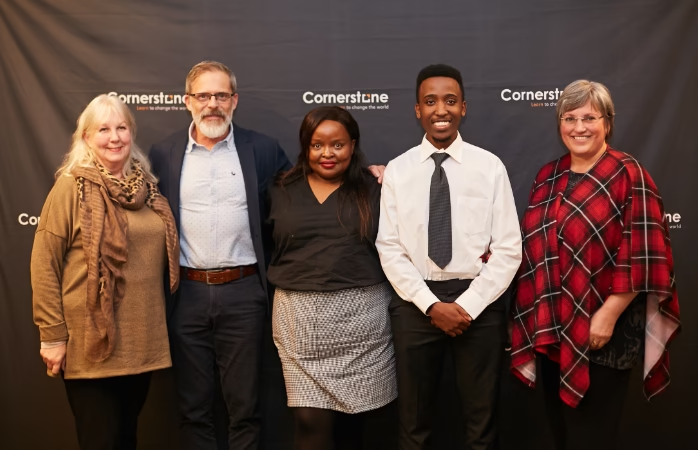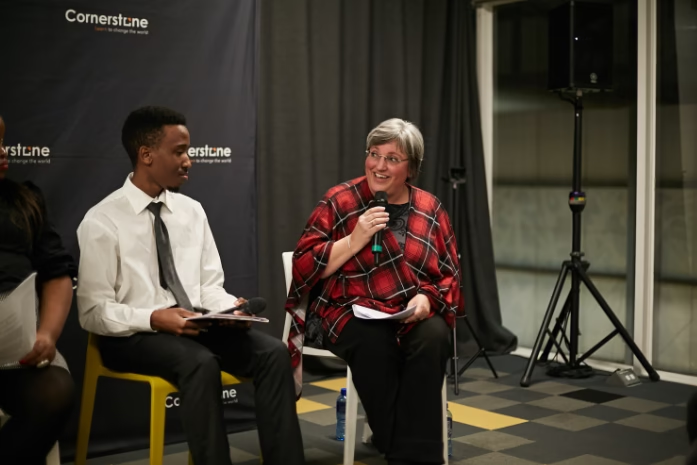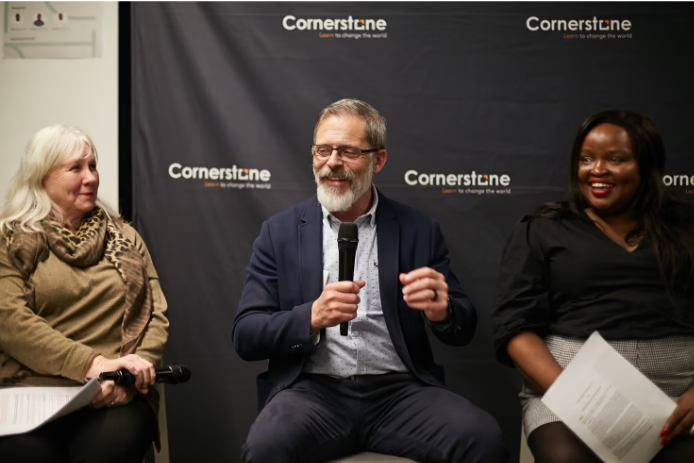On June 26, Cornerstone Institute hosted a critical dialogue on Inclusive and Equitable Quality Education for All: Strengthening the Role of the Private Higher Education Sector for Youth Development. This event brought together experts and leaders from the private higher education (PHE) sector to discuss the industry’s challenges and opportunities.
The panel included:
- Dr. Marianne Louw, Executive Dean, Cornerstone Institute
- Dr. Cobus Oosthuizen, Dean of Postgraduate Studies, Boston City Campus
- Dr. Shirly Lloyd, Former Director of the NQF Directorate in the DHET and Board Member of the Association of Private Providers of Education and Training (APPETD)
- Mr. Omolemo Tlhapane, President of the Student Representative Council, Cornerstone Institute
Zizipho Dyubeni, Marketing Manager at Cornerstone Institute, moderated the panel discussion.


Dr. Shirly Lloyd, Dr. Cobus Oosthuizen, Zizipho Dyubeni, Omolemo Tlhapane, and Dr. Marianne Louw
The Private Higher Education Institutions (PHEIs) sector faces significant challenges that hinder its full potential. The dialogue addressed these pressing challenges and opportunities, highlighting the PHE sector’s critical role in complementing the public education system by expanding its capacity and offering diverse programmes that cater to market demands.
Critical issues discussed included aligning courses with market needs, compliance with regulations and standards, quality assurance, funding for underprivileged students, and the prevalence of unregistered institutions.
Zizipho opened the dialogue with a defining question: “What are the significant differences between public and private higher education?”
One significant difference is that public higher education is funded while private is not. Culture, student-to-teacher ratio, tuition, and reputation are other key differences.
Dr. Marianne Louw noted that, in the past, private institutions tended to focus more on teaching and learning, partly because they were not funded for research. She emphasised that if private institutions want to be recognised as universities, they must also focus on community engagement, among other things.

Dr. Shirly Lloyd responded, “We need to claim our space as critical players in the industry. We must strongly assert our opinions and state that we want to be known as universities, as we all jump through the same hoops with the Council on Higher Education (CHE).”
Private institutions undergo rigorous processes, often more stringent than public ones, ensuring credibility and quality.
Omolemo Tlhapane, President of the SRC, voiced the student perspective on the challenges in private higher education.
“Students need to be educated about breaking into the private higher education space. They need guidance on acquiring funding, understanding the credibility of institutions, and other crucial aspects. They shouldn’t be thrown into the deep end. Private institutions are at the forefront of technological advancement, giving students a competitive edge in the job market.”
An attendee posed an engaging and thought-provoking question: “Given that private universities frequently provide greater employability access, shouldn’t organizations like NSFAS make funding available for the general public to attend private institutions that create more marketable graduates?”
Her point was whether funding authorities such as the National Student Financial Aid Scheme (NSFAS) had a reason not to provide financial assistance to students attending private colleges, which have better employability rates.

This question highlighted the often-overlooked financial difficulties that many students encounter, which can seriously impede their ability to complete their degrees. The subsequent discussion focused on the relationship between financial challenges and student dropout rates, emphasising the need for more comprehensive financial assistance systems to ensure that students can concentrate on their studies without being distracted by financial hardship.
The discussion was stimulating and provocative. It highlighted the need for PHEIs to continuously innovate and adapt to meet the evolving demands of the education sector. It also emphasised the importance of collaboration and shared goals to overcome the challenges private higher education institutions face.
Our moderator closed by saying, “There is work to be done, and we all belong to an ecosystem that must contribute to how we access the solutions.
